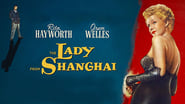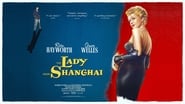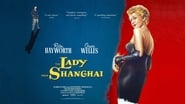Tweekums
This classic film opens with sailor Michael O'Hara rescuing beautiful blonde Elsa 'Rosalie' Bannister from a group of muggers in Central Park. Afterwards as he takes her home he tells her that he is a sailor and she offers him a job crewing her husband's yacht which the couple plan to sail from New York to San Francisco by way of the Caribbean and the Panama Canal. Initially he isn't keen to take the job but eventually he takes in and joins the Bannisters and their friend George Grisby on their voyage. As time passes it is clear that Michael is developing feelings for Elsa; something George has clearly noticed. Then George approaches him with a very strange proposition; he wants to pay Michael $5,000 to murder him! Actually he wants Michael to tell the police that he killed him so he can start a new life on the insurance money, he assures Michael that without a body he can't be prosecuted. Of course it doesn't go as Michael hoped and he finds himself on trial for his life with Rosalie's husband, a renowned defence attorney, representing him.Fans of film noir are sure to like this as is has all the hallmarks of the genre; murder, a twisting plot and most importantly a beautiful femme fatale. Orson Welles does a solid job as Michael, the ordinary man caught up in a deadly scheme, even if his Irish accent seems a bit off. Rita Hayworth is impressive as Rosalie, a woman more dangerous than she appears, Everett Sloane is good as her husband Arthur as is Glenn Anders as George. The story starts relatively slowly, giving us time to get to know the characters then quickly picks up the pace as the plot emerges and the danger becomes apparent. This all leads up to an inventive finale in the hall of mirrors in an out of season funfair. There are moments of comedy; most notably the court room scene where Arthur is called as a witness and ends up cross examining himself! Overall I'd say that this is an impressive film that fans of the genre should watch.
Kirpianuscus
the ordinary guy. the seductive mysterious -vulnerable -sad woman. the meeting in not comfortable circumstances. and the chain of mysteries. classic levels of film noir. The Lady from Shanghai is not an exception and far to be a revelation. but it is really seductive. smart. and the scenes from aquarium and the hall of mirrors are enough for remember it . sure, the basis is the presence of Rita Hayworth and her chance to have her husband as director. the style of Welles gives force and subtle aspects to a story who not only inspire him but becomes, scene by scene, his story. but, out of aura of the first view,The Lady from Shanghai is not exactly memorable. sure, it is a good film. but this status is far to be meritorious. because, after a half of century, like many films from the same genre, it is only a silhouette from the past.
Antonius Block
This classic film noir has it all – a tight script, great scenes on location, and the seductive and beautiful Rita Hayworth. Orson Welles is in the role of the guy realizes he's swimming with sharks, but can't stop himself from doing so. Isn't that a common theme in these movies? At Hayworth's urging, he takes a job on her husband's yacht; her husband (Everett Sloane) is a rich, invalid lawyer who is having his wife followed. Things are uneasy from the outset, and then take a turn for the worse when Sloane's partner Grigsby (Glenn Anders) offers him money out of the blue to commit a murder – on himself, Grigsby. Glenn Anders looks like a maniacal Mike Ditka while making this proposition – oh wait, Mike Ditka already looks maniacal, but you get the idea.Rita Hayworth went blonde for this film, which apparently led to the ire of her fans, but she's a knockout and on top of it, she delivers a strong performance. I'm not sure about Orson Welles' Irish accent, but he did give us a great film, and it really was his baby, having written the screenplay, produced, directed, and starred in it opposite Hayworth, his wife of four years who he would divorce shortly after the film's release. The film has great scenes in San Francisco and Acapulco, the 'open air' feel of which provide an interesting counterpoint to the 'noir' plot. There is also, of course, the iconic final sequence in the hall of mirrors. The film is successful but it's too bad Welles wasn't given full creative control, as a great deal of that last sequence was edited out and destroyed, which is a real shame. One reason I like it is because despite some intricacies in the plot which will keep you guessing, it's all explained logically in the end. Another is Welles' direction, which is intelligent and provides interesting camera angles. I'm not sure why this movie was released to mixed reviews in 1947, but it's worth seeing if you like films in this genre.
classicsoncall
If you like your noir with a little Latin beat, this could be right up your alley. The title is a bit of a misnomer though, since 'The Lady', Elsa Bannister (Rita Hayworth) wasn't from Shanghai, she just happened to be there once. If I hadn't heard all the caveats from the reviewer who introduced the picture on Turner Classics, I wouldn't have considered it to be a 'flawed' picture. Apparently producer Harry Cohn who financed the thing had a lot of problems with the finished film, and had Orson Welles re-shoot a lot of the scenes with Hayworth to feature her glamorous side, hence all the steamy close-ups. Welles was married to Hayworth at the time even though the marriage was kaput, so watching both of them get passionate on screen must have been a real exercise in acting effort.You might need to catch the story a couple of times to figure out the murder plot, but it's all spelled out by the principals - Grisby (Glenn Anders) killed Broome (Ted de Corsia) when Broome discovered the plan to kill Arthur Bannister (Everett Sloane) and frame Michael (Welles) for the murder. Elsa (Hayworth) killed Grisby once she knew Michael had written the confession, but that left her husband still alive to represent Michael as the world's greatest criminal attorney. The fun house mirror maze would have worked out fine for Elsa if she and Arthur hadn't shot each other, but I guess you can't have everything.The schlub in the story was Michael, but he knew that all along. He inadvertently managed to follow the premise he offered at the start of the picture - "One who follows his nature keeps his original nature in the end". Apparently so did all the rest, managing to fulfill their nature as sharks, mad with their own blood.







